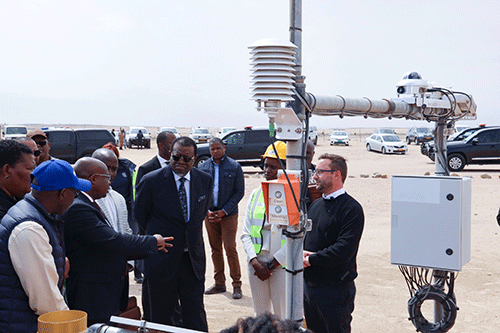SWAKOPMUND –Namibia is currently in demand due to the impact that green hydrogen has on the world, and the nation must have the same vision to attract investors.
President Hage Geingob said this yesterday shortly after visiting Namport and the Cleanergy green hydrogen plant behind Dune 7 as part of his familiarisation visit to the coast.
“They need to see that we are prepared as Namibians to move on to another phase. I’m telling you, in the world, we are very popular,” he beamed.
“I am glad that we are an item and talking the same language, and talking about our country as the future energy source. Of course, the harbour is important in this journey, and I am glad that you are also preparing as you will be playing a pivotal role”, he added.
The President was accompanied by trade minister Lucia Iipumbu, National Planning Commission director general Obed Kandjoze, hydrogen commissioner James Mnyupe as well as Erongo governor Neville Andre to witness the strides being made in realising Namibia’s green hydrogen dream, in which the coast plays a strategic role.
Apart from the green hydrogen project, the President also stopped over at the Orano desalination plant in Swakopmund to witness their alignment with Namibia’s green hydrogen ambitions.
Reflecting on his initial unfamiliarity with green hydrogen, he credited Mnyupe for introducing the concept which was incorporated in the Harambee Prosperity Plan.
“I did not know anything about green hydrogen. James came, and we inserted the concept into the Harambee Prosperity Plan. I did not know it then, but now we are all talking the same language,” the President said.
His visit also aimed to assess progress in the development of the green industrialisation agenda, as outlined in the goals of the Harambee Prosperity Plan II.
Water for green hydrogen
Meanwhile, principals at the Orano desalination plant, which supplies water to various mines as well as coastal towns, say they are fully capacitated to support green hydrogen projects in the region.
The facility, which is currently operated by Nafasi Water Technologies, boasts a capacity of 20 million cubic meters per annum, with the potential to upgrade to 25 million cubic meters per annum without the need for additional construction.
Orano board chairperson Hilifa Mbako, who briefed the president on their readiness, said they are fully committed to the economic and financial benefits that green hydrogen can bring to Namibia by making water available.
“We are happy that you are here to see what we are doing. We are continuously providing water from the state-of-the-art facility, which the people of the Erongo region have every reason to be proud of,” he said.
Mbako added that their biggest task ahead is to support the rapidly-developing green hydrogen sector.
“We are ready and capable of supplying water to all the components of green hydrogen in this region. Green hydrogen is not a dream but a journey that we, as a company, are embracing wholeheartedly,” he told the President.
Orano managing director Tommie Gouws said the plant is the largest reverse osmosis seawater desalination complex in southern Africa.
“Thanks to the plant, we are confident that we can meet the needs of the emerging green hydrogen industry in the region. Our state-of-the-art technology is unmatched,” he affirmed.
After touring the facility, Geingob commended the Orano desalination plant’s pledge to support green hydrogen projects in the region, saying it underscores Namibia’s commitment to sustainability and the growing global demand for green hydrogen as a clean energy source.
He then expressed his admiration for the progress made by the facility, and the green hydrogen projects in the region.
The Namibian leader highlighted the country’s commitment to a just energy transition, aiming to decarbonise industries, combat climate change, and adopt cleaner fuels.
“Namibia recognises the global imperative for a just energy transition, and we are embracing cleaner fuels through the production of green hydrogen.”
Legacy
Geingob reiterated his desire to leave Namibia in good hands.
He pointed out that his tenure involved dealing with significant challenges, including severe droughts, an economic downturn, and the impact of the Covid-19 pandemic.
“Therefore, I came just to see before I hand over. I have to leave this country in good shape. It was not an easy task when I took over. A severe drought and the economic downturn at that time were very challenging. On top of that, Covid-19 hit us while we were navigating out of it. It was really a crisis management situation, but then things changed, and we are now ready to move Namibia as the source of energy. Now, when we go to Brussels with our experts, we can go sell Namibia in terms of how ready we are and the progress we have made,” Geingob enthused.
Brussels will host the Global Gateway Forum later this month.
– edeklerk@nepc.com.na



